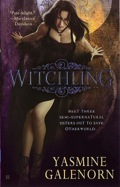
 Proven Guilty
Proven Guilty
By Jim Butcher; Read by James Marsters
Audible Download – approx. 16 hours [UNABRIDGED]
Publisher: Penguin Audio
Published: 2009
Themes: / Fantasy / Urban Fantasy / Magic / Chicago / Wizard / Faeries / Vampires / Black Magic
By the time most fantasy series reach their eighth novel, they’re usually showing their age. For proof, one need look no further than Robert Jordan’s Wheel of Time, in which the eighth book, Path of Daggers, is seen as the beginning of the cycle’s decline, although some would place this event significantly earlier. In any case, Jim Butcher’s Dresden Files series certainly doesn’t follow this trend. In fact, Proven Guilty suggests that the series just keeps getting better.
The novel initially follows the series formula: Chicago wizard-for-hire Harry Dresden faces a series of seemingly-disconnected incidents which, as the plot progresses, reveal themselves to be connected in a sinister way. The White Council is on the lookout for black magic; monsters from the big screen are wreaking havoc at a horror fan convention; and Molly Carpenter, daughter of Harry’s good friend Michael, is in some kind of mysterious trouble. Harry must juggle all these fly balls and, as usual, keep himself from getting killed. He’s aided by the usual cast of supporting characters like officer Karin Murphy and the elemental Bob the Skull., and White Court vampire Thomas.
Harry soon discovers that the faerie courts of Summer and Winter have taken an interest in recent events. Perhaps this is why I enjoyed Proven Guilty so much, since it evoked themes from the other faerie-centric novel in the series so far, Summer Knight, which is also one of my favorites. Butcher writes about the fae as if they are both inscrutably beautiful and incalculably terrifying. In general, the Summer Court tends to side with the “powers of good”, while the Winter Court allies itself with “evil”, but faerie politics aren’t quite that simple. Summer can be incredibly crafty and deceptive, while denizens of Winter are prone to occasional acts of kindness and sacrifice.
This moral ambiguity cuts to the heart of the success of Proven Guilty. Themes of morality, self-control, parenthood, and responsibility abound. Butcher’s early novels felt like little more than exciting detective thrillers with a supernatural twist–entertaining, witty, humorous, but lacking any real depth. In later Dresden Files novels, Butcher has cultivated a heightened emotional sensitivity. in Proven Guilty, this manifests most prominently in Harry’s complex relationship with the Carpenter family. Without giving too much away, suffice to say that the execution of a young boy at the hands of the White Council for misuse of magic holds more than a hint of foreshadowing.
James Marsters, of Buffy the Vampire Slayer fame, narrates the novel flawlessly. His hard-boiled narrative style perfectly fits the book’s genre as a detective story, and his dust-dry rendition of Harry Dresden’s dialogue captures the wizard’s lonely character perfectly. Marsters also handles the female characters deftly, avoiding the pitfall of overacting that some other male vice actors fall prey to.
Readers might get away with reading Proven Guilty as a stand-alone novel, since it does a passable job of weaving backstory into the plot in an unobtrusive manner, but it’s worth reading the Dresden Files series from the beginning. Unfortunately, books six and seven (Blood Rites and Dead Beat) haven’t yet received the audio treatment, though they’re schedules for release sometime in the coming months. It’s well worth plodding through those two volumes in print.
Also take a look at SFFaudio’s favorable review of Small Favor, book ten in the series, which I’m immensely looking forward to once I’ve read the intervening White Night.
Posted by Seth Wilson
 Witchling
Witchling